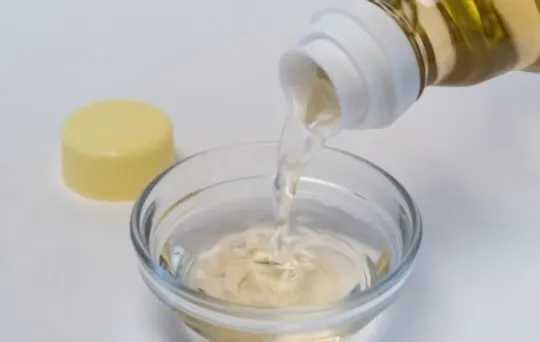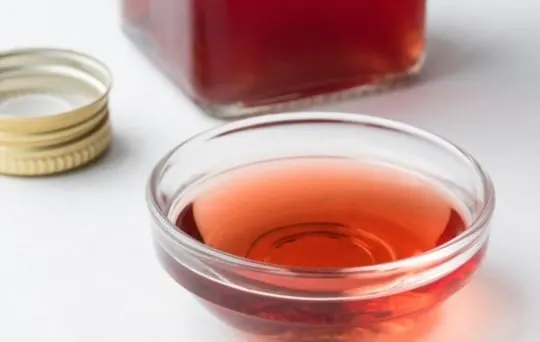Whoops! Found yourself in a pickle because the sherry vinegar took a rain check from your pantry? No biggie.
We’ve all been there, ready to whip up something that’s gonna knock everyone’s socks off, only to find a key ingredient’s gone AWOL.
Good news, though. We’re here to bail you out with the best sherry vinegar substitutes that are probably chilling in your kitchen right now.
Each swap we’re about to spill isn’t just a makeshift solution; they’re legit game changers.
Ready to turn your cooking crisis into a victory? Let’s get into it.
What is Sherry Vinegar?

Sherry vinegar is a type of vinegar made from sherry wine.
It has a deep, complex flavor and is often used in salads, marinades, and sauces.
Sherry vinegar is made by fermenting sherry wine.
The fermentation process converts the sugars in the wine into acetic acid, which gives sherry vinegar its distinctive tang.
Sherry vinegar has a wide range of flavors, from sweet and fruity to dry and savory.
It can also vary in color, from pale straw-like hues to deep amber tones.
When choosing a sherry vinegar, look for one with a rich flavor and aroma that complement the dish you’re planning to make.
The 5 Best Substitutes for Sherry Vinegar
Several substitutes will work in a pinch for those who don’t keep sherry vinegar on hand.
| Substitute | Key Characteristics | Substitute Ratio |
|---|---|---|
| Rice Wine Vinegar | Mild, slightly sweet, and delicate flavor | Use an equal amount of rice wine vinegar as a substitute for sherry vinegar |
| Champagne Vinegar | Light, crisp, and slightly acidic | Use an equal amount of champagne vinegar as a substitute for sherry vinegar |
| White Wine Vinegar | Subtle fruity undertones with a mild acidity | Use an equal amount of white wine vinegar as a substitute for sherry vinegar |
| Red Wine Vinegar | Robust, tangy, and slightly more intense than sherry vinegar | Use an equal amount of red wine vinegar as a substitute for sherry vinegar |
| Lemon / Lime Juice | Bright, tangy, and citrusy flavor | Use half the amount of lemon or lime juice as a substitute for sherry vinegar |
When it comes to enhancing flavors in your dishes and finding substitutes for sherry vinegar, consider these five options:
1 – Rice Wine Vinegar

Rice wine vinegar is a popular ingredient in many Asian dishes and can also be used as a substitute for sherry vinegar.
Rice wine vinegar is made from fermented rice and has a milder flavor than sherry vinegar.
It is also lower in acidity, so it can be used in recipes that call for vinegar with less color and flavor.
When substituting rice wine vinegar for sherry vinegar, start with half the amount of vinegar called for in the recipe.
You can always add more, but you can’t remove it once it’s added.
If you’re using rice wine vinegar in a salad dressing or other cold dish, there’s no need to heat it first.
However, if you’re using it in a cooked dish, you’ll need to heat it to evaporate the water content.
Use an equal amount of rice wine vinegar as a substitute for sherry vinegar to maintain a similar taste profile.
2 – Champagne Vinegar
If you’re out of sherry vinegar and need a substitute for your recipe, don’t despair.
Champagne vinegar makes a great stand-in for sherry vinegar.
Both kinds of vinegar are made from white wine, so they have a similar flavor profile.
The main difference is that champagne vinegar is less sweet than sherry vinegar.
So, if your recipe calls for sherry vinegar and you only have champagne vinegar on hand, you may want to add a little sugar to the mix to balance the flavors.
But overall, champagne vinegar is a great substitution for sherry vinegar in any recipe.
Use an equal amount of champagne vinegar as a substitute for sherry vinegar to add a similar tanginess to your dishes.
3 – White Wine Vinegar

White wine vinegar and sherry vinegar are two of the most popular types of vinegar used in cooking.
Both have a distinct, acidic flavor that can add a unique dimension to a dish.
However, they also have some key differences.
White wine vinegar is made from, well, white wine.
It has a light, fruity flavor that pairs well with salads and fish dishes.
On the other hand, Sherry vinegar is made from sherry, a type of fortified wine.
As a result, it has a richer, more complex flavor that goes well with heavier dishes like stews and risottos.
While both kinds of vinegar can be used interchangeably in some recipes, it’s important to be aware of these flavor differences to choose the vinegar that best suits your dish.
Use an equal amount of white wine vinegar as a substitute for sherry vinegar to provide a similar level of acidity and a touch of fruitiness.
4 – Red Wine Vinegar

In many recipes, red wine vinegar can be a great substitute for sherry vinegar.
Red wine vinegar is made from red wine that has been fermented, while sherry vinegar is made from sherry that has been fermented.
Although they have different flavors, both kinds of vinegar can add a tart and acidic kick to dishes.
Both kinds of vinegar can be used in marinades, sauces, and salad dressings.
They can also be used to deglaze a pan or to add acidity to stews and soups.
If you’re out of sherry vinegar and need a substitute, reach for the red wine vinegar instead.
Use an equal amount of red wine vinegar as a substitute for sherry vinegar if you desire a stronger and more pronounced flavor.
5 – Lemon / Lime Juice

Consider using lemon or lime juice if you’re in a pinch and need a sherry vinegar substitute.
Both of these citrus fruits are acidic, which will give your dish the desired tartness.
For a citrusy alternative, use half the amount of lemon or lime juice as a substitute for sherry vinegar.
You may also want to add a bit of sugar to balance the acidity.
If you’re using lemon juice, you could add a drop or two of water to thin it out and give it a more consistent consistency to vinegar.
Conclusion
Though sherry vinegar is a key ingredient in many classic recipes, it can be difficult to find in stores.
Even when you manage to track some down, it can be expensive.
Fortunately, several substitutes can be used in its place.
Red wine vinegar, white wine vinegar, and Champagne vinegar are good substitutes for sherry vinegar.
If you need a non-alcoholic option, apple cider vinegar or rice vinegar will work just as well.
With so many options available, there’s no need to go without sherry vinegar in your cooking.
Just choose the substitute that best fits your needs and budget.

The 5 Best Substitutes for Sherry Vinegar
Ingredients
- Rice Wine Vinegar
- Champagne Vinegar
- White Wine Vinegar
- Red Wine Vinegar
- Lemon / Lime Juice
Instructions
- Pick your favorite substitute from the list above.
- Follow cooking directions for your selected substitute with the proper ratio of ingredients.

Andrew Gray is a seasoned food writer and blogger with a wealth of experience in the restaurant and catering industries. With a passion for all things delicious, Andrew has honed his culinary expertise through his work as a personal chef and caterer.
His love for food led him to venture into food writing, where he has contributed to various online publications, sharing his knowledge and insights on the culinary world. As the proud owner of AmericasRestaurant.com, Andrew covers a wide range of topics, including recipes, restaurant reviews, product recommendations, and culinary tips.
Through his website, he aims to inspire and educate fellow food enthusiasts, offering a comprehensive resource for all things food-related.

Leave a comment